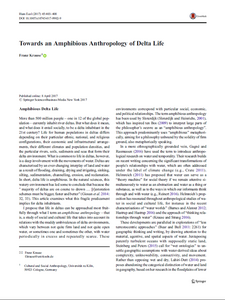We are proud to announce the first publication from the project. This is a short set of considerations about what may be specific and relevant in an anthropological approach to life in river deltas.
The article, published in the journal Human Ecology in June 2017, outlines four dimensions for the study of human lives in major river deltas, which focus on the particular amphibious predicaments of these lives. These dimensions reflect that river deltas are environments characterised by ongoing transformations of wet-and-dry places, trajectories, practices and relations.
In this publication, we suggest that grounding an anthropology of delta life in the volatility of hydrological flows and social relationships can, on the one hand, help to identify the specific challenges and opportunities that delta inhabitants are facing around the world; on the other hand, this focus also allows for reassessing, in empirically-based ways, the recent critiques of social theory as overly static and rigid.
The article proposes four dimensions of an amphibious anthropology of delta life:
- An understanding of hydrosocial relations as those relationships between people that are as much about sociality in the classic sense, as about water flows in a material sense;
- A focus on volatility and creativity;
- An attention to the shifting affordances of wet, dry and in-between environments;
- An investigation of the rhythms through which social and ecological life transforms and develops.
Developing this study field can build on a range of anthropological, historical and geographical work that has focused on life in floodplains, wetlands and bogs, on rivers and along coasts. The article reviews some of these contributions and argues that taking their insights further means conceiving the anthropology of deltas as a field that takes hydrosocial relations to heart, and understands their volatile rhythms not as occasional deviations from a constant status quo, but as everyday processes.
The article grew out of - or rather, was boiled down from - a paper presented at the University of Bremen's lecture series Wie blau ist das Meer. Kulturen der See. Without the friendly invitation to participate in the series, and the productive feedback after the presentation, this article might never have been written in the same way...
You can access the full text at http://rdcu.be/qTlS
If you have trouble getting access, please contact the author directly.

